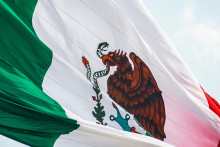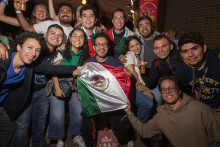It received the label of a ‘focus country’ only about two years ago, but the University of Twente has had connections with Mexico for much longer than that. Already in the 1990’s large groups of Mexican professors started coming to the UT to learn about the local educational model. The ties with the North American country have only grown stronger since.
Mexico: facts & Figures
Structured interest of the UT since: 2007
Main focus: educational and research cooperation, student exchange programs
Other activities: joint research projects, recruitment of students (graduate level)
Examples of partner institutions: UNAM (National Autonomous University of Mexico), Tecnológico de Monterrey
Development over the years:
|
Mexico (number of students per year) |
2015/16 |
2016/17 |
2017/18 |
2018/19 (preliminary number) |
|
Enrolled (Master and Bachelor) students |
16 |
23 |
26 |
|
|
Influx of Bachelor students |
1 |
0 |
1 |
0 |
|
Influx of Master students |
14 |
11 |
11 |
9 |
UT staff involved: Karin Paardenkooper (country coordinator)
Three main partners
‘We currently have two main partner universities in Mexico,’ begins Karin Paardenkooper, the country coordinator for Mexico. ‘UNAM, the number one research university in Mexico with branches in seven cities and 250.000 students, and the Tecnológico de Monterrey with 100.000 students in 30 locations. The latter, often called the ‘Tec’, is also a member of ECIU (European Consortium of Innovative Universities) and has a very similar profile to Twente – it has very strong ties with industry and was founded under similar circumstances as the UT. We also have a formal agreement with the National Council for Science and Technology CONACyT, which is a government institution. They offer financial support for Master and PhD education and research for Mexicans to come to the UT and even for UT graduate students to do research in Mexico.’
Student exchange is a big part of the UT’s collaboration with Mexican institutions. The first exchange students arrived here in 2004 and their numbers have been steadily increasing. The new student exchange agreement with the Tecnológico de Monterrey represents the biggest exchange agreement the UT has. 'We receive students from all those 30 Tec campuses and we send UT students to the two Tec campuses in the cities of Monterrey and Queretaro. Those two campuses have something unique to offer and it allows our students to acquire extra knowledge and skills, a real addition to their UT studies,' clarifies Paardenkooper.
Strong content and community
As the country coordinator points out, Mexican students are coming to Twente more and more, and not only for a one year exchange. Many are choosing to get their Master's degree here. Why is that? 'I think they choose the UT based on content. They come here for our study programmes and research facilities,' answers Paardenkooper. 'In Mexico, the government decides what the economic priorities are and then scholarships can be applied for by CONACyT in those areas. Water, environment and renewable energies, nanotechnology, biotechnology and advanced materials have been highly important areas in education for Mexico in the last years. This is what the country needs to develop and that is the knowledge we have at the UT. Moroever,’ she adds. ‘Right now we are experiencing the "Trump effect". Since president Trump was elected, Mexicans turn to Europe more.'
Still, there are countless universities to choose from in Europe. What is it that attracts them to Twente? 'One thing is our campus. Campuses like ours are very common in Mexico and so the environment feels familiar to them. Mexicans are used to knowing each other and there is a Latin American community in Enschede and an Latin American association LA Voz at the university. Another thing: a regular Mexican city easily counts four million inhabitants. Enschede is very different. Students know they will find each other and they feel protected and safe here. It’s also important that we have religious associations here, because Mexicans usually go to church. All in all, everything they need is right here.'
'Students know they will find each other and they feel protected here'
Friendship
The UT's focus on Mexico certainly isn't only about student recruitment. Collaboration includes joint research projects and publications, but also staff exchange and cooperation on an institutional level. For example, the Tecnológico de Monterrey is now planning to extend its work with the UT even further. 'This partnership focuses on intensifying cooperation at the graduate level,' says Paardenkooper, and adds: 'We need to meet to make all this work. Friendship is an important part of partnership in Mexico. We can work together only if we trust each other like friends, if we meet and eat together.' And working together is definitely beneficial for both sides, thinks Paardenkooper. 'Everybody who has visited our Mexican partner universities is always wowed because particularly the Tec is so much more modern than they expected. We can learn a lot from each other.'

Photo of all country coordinators and 'focus countries relevant' staff. Karin Paardenkooper second from the right. Photo by: Gijs van Ouwerkerk
What about other cultural specifics? Is there anything that you need to take into account when working with Mexican people and organizations? 'Mexicans are flexible,' thinks the country coordinator. 'You never know if an appointment won’t change in time or date. But if they say that something will happen, it will happen. They are flexible, but reliable.'
‘Spider in a web’
With so many projects and existing partnerships already set up, is there anything the UT wants to add to their collaboration with Mexico? 'We are not looking for new partners in Mexico at the moment, but if researchers would express that they’d want or need a formal agreement with yet another Mexican partner of course we will support it. Such agreements are made because researchers or students want them,' says the country coordinator, whose job basically means she needs to stay up-to-date about what people want in terms of international collaborations and how they could get it. 'My job is to inform people, stay informed myself and support where needed. I need to follow news, on science, news on economy, politics and funding. I’m like a spider in a web. I’m working to get a stable web between Twente and Mexico.'
student's voice: 'I suffered because I didn't know how the small things should work'
Mimi Juárez Bocanegra (MSc. Industrial Design Engineering)
What made you decide to study at the UT?
‘I first came as an exchange student in 2010 during my Bachelor studies. I decided to follow the IDE programme because I had an incredible experience during my exchange year, carrying out projects with Dutch companies such as VacuVin and Gazelle. I wanted to study the Master's program here because the UT program focuses a lot on engineering as part of the design and development of products and that is the most relevant for my career path. I was also interested in TU Delft but they were definitively not as "in touch" with prospective students as the UT is.’
What do you like and don’t like about studying here?
‘I like the way of teaching and the fact that we can organize our study life to our best interests. I also like the fact that student projects are often linked to real companies. I dislike feeling lost at times. I suffered often because in principle I didn't know how the small things should work: like reserving a study room or having to register for an exam. Those are little things that might not be so clear to international students at the beginning.’
Is there something the UT can do to get more Mexican students and/or to make it easier for them to study here?
‘I think the introduction period is really important because that is when we start our adventure at the UT. But it is also important not to let Mexican students and international students in general on their own once they are in their second year. Some of them might feel lost when trying to find an internship or not knowing what to do regarding their graduation projects. And they are often here on a scholarship so they might feel some pressure. Helping them avoiding any delay in their study might be of great help.’







